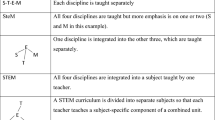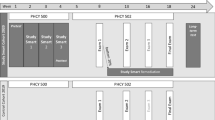Abstract
Purpose
This study aims to design, implement, and launch courses that integrate foundational science learning and clinical application in a post-clerkship undergraduate medical school curriculum.
Method
In academic year 2015–2016 (AY15–16), as part of a comprehensive curricular revision, Vanderbilt University School of Medicine (VUSM) formally implemented “Integrated Science Courses” (ISCs) that combined rigorous training in the foundational sciences with meaningful clinical experiences. These courses integrated foundational sciences that could be leveraged in the clinical environment, utilized a variety of instructional modalities, and included quantitative and qualitative (competency-based milestones) student assessments. Each ISC underwent a rigorous quality-improvement process that required input on foundational science content, student experience, and student performance assessment.
Results
Eleven ISCs were delivered to 173 students in AY15–16, with some students taking more than one ISC. Immediately after completing each course, 93% (n = 222) of ISC enrollees completed a course evaluation. Students (91%; n = 201) “agreed” or “strongly agreed” that foundational science learning informed and enriched the clinical experiences. Furthermore, 94% (n = 209) of students thought that the clinical experiences informed and enriched the foundational science learning. Ninety-four percent of the students anticipated using the foundational science knowledge acquired in future clinical training and practice.
Conclusion
The teaching of foundational sciences in the clinical workplace in the post-clerkship medical curriculum is challenging and resource intensive, yet feasible. Additional experience with the model will inform the mix of courses as well as the breadth and depth of foundational science instruction that is necessary to foster scientifically based clinical reasoning skills in each student.



Similar content being viewed by others
Notes
At VUSM, foundational sciences are broadly defined to encompass the knowledge and skills that form the foundation of clinical practice; it focuses on the “why” of patient care rather than the “what” or “how” (i.e., clinical decision making). Foundational science includes basic science, population and system science, sociological and psychological science, and where appropriate, humanities (e.g., medical ethics). The emphasis is on origins, composition, purpose, mechanisms, interactions, and consequences.
References
Mylopoulos M, Regehr G. How student models of expertise and innovation impact the development of adaptive expertise in medicine. Med Educ. 2009;43(2):127–32. https://doi.org/10.1111/j.1365-2923.2008.03254.x.
Cutrer WB, Miller B, Pusic MV, Mejicano G, Mangrulkar RS, Gruppen LD, Hawkins RE, Skochelak SE, Moore DE, Jr. (2017) Fostering the development of master adaptive learners: a conceptual model to guide skill acquisition in medical education. Acad Med 92 (1):70–75. doi:https://doi.org/10.1097/ACM.0000000000001323.
Flexner A (1910) Medical education in the United States and Canada. A Report to the Carnegie Foundation for the Advancement of Teaching. Boston, MA.
Woods NN, Brooks LR, Norman GR. The value of basic science in clinical diagnosis: creating coherence among signs and symptoms. Med Educ. 2005;39(1):107–12. https://doi.org/10.1111/j.1365-2929.2004.02036.x.
Woods NN, Neville AJ, Levinson AJ, Howey EH, Oczkowski WJ, Norman GR. The value of basic science in clinical diagnosis. Acad Med. 2006;81(10 Suppl):S124–7. https://doi.org/10.1097/00001888-200610001-00031.
Woods NN. Science is fundamental: the role of biomedical knowledge in clinical reasoning. Med Educ. 2007;41(12):1173–7. https://doi.org/10.1111/j.1365-2923.2007.02911.x.
deBruin ABH, Schmidt HK, Rikers RM. The role of basic science knowledge and clinical knowledge in diagnostic reasoning: a structured equation modeling approach. Acad Med. 2005;80(8):765–73. https://doi.org/10.1097/00001888-200508000-00014.
Finnerty EP, Chauvin S, Bonaminio G, Andrews M, Carroll RG, Pangaro LN. Flexner revisited: the role and value of the basic sciences in medical education. Acad Med. 2010;85(2):349–55. https://doi.org/10.1097/ACM.0b013e3181c88b09.
Kulasegaram KM, Martimianakis MA, Mylopoulos M, Whitehead CR, Woods NN. Cognition before curriculum: rethinking the integration of basic science and clinical learning. Acad Med. 2013;88(10):1578–85. https://doi.org/10.1097/ACM.0b013e3182a45def.
Kulasegaram K, Manzone JC, Ku C, Skye A, Wadey V, Woods NN. Cause and effect: testing a mechanism and method for the cognitive integration of basic science. Acad Med. 2015;90(11 Suppl):S63–9. https://doi.org/10.1097/ACM.0000000000000896.
Mylopoulos M, Woods N. Preparing medical students for future learning using basic science instruction. Med Educ. 2014;48(7):667–73. https://doi.org/10.1111/medu.12426.
Bransford JD, Schwartz DL. Rethinking transfer: a simple proposal with multiple implications. Rev Res Educ. 1999;24:61–100.
Mylopoulos M, Lohfeld L, Norman GR, Dhaliwal G, Eva KW. Renowned physicians’ perceptions of expert diagnostic practice. Acad Med. 2012;87(10):1413–7. https://doi.org/10.1097/ACM.0b013e31826735fc.
Mylopoulos M, Regehr G. Cognitive metaphors of expertise and knowledge: prospects and limitations for medical education. Med Educ. 2007;41(12):1159–65. https://doi.org/10.1111/j.1365-2923.2007.02912.x.
Cooke MI, Irby DM, O'Brien BC, Shulman LS. Educating physicians: a call for reform of medical school and residency: Jossey-Bass; 2010.
Ling Y, Swanson DB, Holtzman K, Bucak SD. Retention of basic science information by senior medical students. Acad Med. 2008;83(10 Suppl):S82–5. https://doi.org/10.1097/ACM.0b013e318183e2fc.
Schmidt HG, Machiels-Bongaerts M, Hermans H, ten Cate TJ, Venekamp R, Boshuizen HP. The development of diagnostic competence: comparison of a problem-based, an integrated, and a conventional medical curriculum. Acad Med. 1996;71(6):658–64. https://doi.org/10.1097/00001888-199606000-00021.
Goldman E, Schroth WS. Perspective: deconstructing integration: a framework for the rational application of integration as a guiding curricular strategy. Acad Med. 2012;87(6):729–34. https://doi.org/10.1097/ACM.0b013e318253cad4.
Vanderbilt University School of Medicine (2017) https://medschool.vanderbilt.edu/ume/curriculum-20.
Harden RM. What is a spiral curriculum? Med Teach. 1999;21(2):141–3. https://doi.org/10.1080/01421599979752.
Norman G. Teaching basic science to optimize transfer. Medical Teacher. 2009;31(9):807–11. https://doi.org/10.1080/01421590903049814.
Swing SR, Clyman SG, Holmboe ES, Williams RG. Advancing resident assessment in graduate medical education. J Grad Med Educ. 2009;1(2):278–86. https://doi.org/10.4300/JGME-D-09-00010.1.
Nasca TJ, Philibert I, Brigham T, Flynn TC. The next GME accreditation system—rationale and benefits. N Engl J Med. 2012;366(11):1051–6. https://doi.org/10.1056/NEJMsr1200117.
Pettepher CC, Lomis KD, Osheroff N. From theory to practice: utilizing competency-based milestones to assess professional growth and development in the foundational science blocks of a pre-clerkship medical school curriculum. Medical Sci Educ. 2016;26(3):491–7. https://doi.org/10.1007/s40670-016-0262-7.
Lomis KD, Russell RG, Davidson MA, Fleming AE, Pettepher CC, Cutrer WB, et al. Competency milestones for medical students: design, implementation, and analysis at one medical school. Med Teach. 2017;39(5):494–504. https://doi.org/10.1080/0142159X.2017.1299924.
Acknowledgements
We thank Dr. Bonnie Miller and the Vanderbilt University School of Medicine (VUSM) leadership for their support, the ISC directors, and the faculty who delivered and/or reviewed the foundational sciences in the ISCs. We also thank Dr. Charlene Dewey for constructing and executing Curriculum Design Sessions for the ISC directors. The Immersion Phase medical student liaisons Deirdre Finnegan, Nathan Friedman, and Jared Shenson provided ongoing course feedback. Special thanks to Brenna Hansen and Kacy Morgan, Immersion Phase Program Coordinators, for their administrative support.
Funding
Kimberly Brown Dahlman was supported in part by grants 5P30CA068485-21 and U10CA180847 from the National Institutes of Health (NIH) and the TJ Martell Foundation. Neil Osheroff was supported in part by grant GM033944 from the NIH and Merit Review award I01Bx002198 from the United States Veterans Administration. Matthew Weinger’s time was supported in part by the Geriatric Research Education and Clinical Centers of the Department of Veterans Affairs. Donald E Moore was supported in part by CMS Contract 1L1CMS331461-01-00 with Vanderbilt University and The Mid-South Practice Transformation Network. The innovation described in this study was implemented with partial financial support from the American Medical Association (AMA) as part of its Accelerating Change in Medical Education Initiative. The content of this manuscript reflects the views of VUSM and does not necessarily represent the views of AMA or other participants in this Initiative.
Author information
Authors and Affiliations
Corresponding author
Ethics declarations
All procedures performed in studies involving human participants were in accordance with the ethical standards of the institutional and/or national research committee and with the 1964 Helsinki declaration and its later amendments or comparable ethical standards.
Conflict of Interest
The authors declare that they have no conflict of interest.
Electronic Supplementary Material
Online resource 1
Characteristics of Integrated Science Courses. The table describes the core foundational sciences, clinical settings, and sample curricular elements for each of the 11 ISCs launched at VUSM in academic year 2015–2016. (PDF 121 kb)
Online resource 2
Course evaluation survey. This anonymous electronic survey was sent to students after the completion of each ISC in academic year 2015–2016. Students were required to complete the survey no later than 2 weeks after the end of each course. (PDF 162 kb)
Online resource 3
ISC Evaluation outcomes. A table containing student ratings of particular ISC elements from academic year 2015–2016 is shown. (PDF 107 kb)
Rights and permissions
About this article
Cite this article
Dahlman, K.B., Weinger, M.B., Lomis, K.D. et al. Integrating Foundational Sciences in a Clinical Context in the Post-clerkship Curriculum. Med.Sci.Educ. 28, 145–154 (2018). https://doi.org/10.1007/s40670-017-0522-1
Published:
Issue Date:
DOI: https://doi.org/10.1007/s40670-017-0522-1




